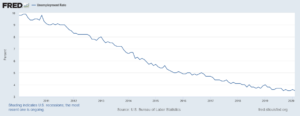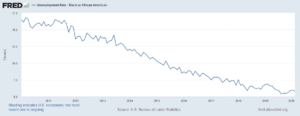
• BudgetEconomic Crisis and RecoveryCrisis económica y recuperaciónIntellectual PropertyPropiedad Intelectual

Top Biden adviser, and long-time personal friend, Ted Kaufman was seen in the Wall Street Journal warning that the debt run up by the Trump administration will seriously limit what Biden will be able to do as president. This is wrong big time, and it is the sort of silly thing that no one in a Biden administration should ever be saying.
The government’s ability to spend is limited by the economy’s ability to produce, not the debt. If the government spends too much, it will lead to inflation. When we have a period of high unemployment, as is the case now and almost certainly will still be the case if Biden takes office in January, we are very far from hitting the economy’s inflation barriers.
It takes some very deliberate head in the ground economics to argue that we are somehow limited by the size of the government debt. Japan provides a great model here. Its ratio of debt to GDP is more than 250 percent, more than twice the current U.S. level. Yet, the country is seeing near zero inflation and has a 0.03 percent interest rate on its long-term debt. The interest on its debt is near zero, since much of its debt carries a negative interest rate.
The idea that we would not address pressing needs, like climate change, child care, and health care because we are concerned about the debt burden is close to crazy. As long as the economy is not near its capacity, there is zero reason not to spend to address these priorities, and even when it does approach its capacity, we can impose higher taxes on the economy’s big winners over the last four decades.
I will also throw in one important item of logic that our deficit and debt hawks should be forced to deal with. When the government issues patent and copyright monopolies to pharmaceutical and software and other companies, this is a form of implicit debt. These monopolies are effectively private taxes that the government allows these companies to collect in exchange for their innovations or creative work.
The rent payments on these monopolies run into many hundreds of billions annually and quite possibly exceed $1 trillion a year. They dwarf interest payments on the debt. The debt whiners don’t get to exclude this implicit debt from their calculations just because they like the companies and individuals who benefit from these rents.
If people are having a hard time understanding the logic here, we can go back to pre-revolutionary France. To deal with its huge debt the government would sell off the right to collect specific taxes. I guess Mr. Kaufman and other deficit hawks would say this is fine since the country now had a lower debt burden, but that is not a serious position. It would be good if the economics profession could be united in explaining this simple logic to laypeople, but as is often said, economists are not very good at economics.
Top Biden adviser, and long-time personal friend, Ted Kaufman was seen in the Wall Street Journal warning that the debt run up by the Trump administration will seriously limit what Biden will be able to do as president. This is wrong big time, and it is the sort of silly thing that no one in a Biden administration should ever be saying.
The government’s ability to spend is limited by the economy’s ability to produce, not the debt. If the government spends too much, it will lead to inflation. When we have a period of high unemployment, as is the case now and almost certainly will still be the case if Biden takes office in January, we are very far from hitting the economy’s inflation barriers.
It takes some very deliberate head in the ground economics to argue that we are somehow limited by the size of the government debt. Japan provides a great model here. Its ratio of debt to GDP is more than 250 percent, more than twice the current U.S. level. Yet, the country is seeing near zero inflation and has a 0.03 percent interest rate on its long-term debt. The interest on its debt is near zero, since much of its debt carries a negative interest rate.
The idea that we would not address pressing needs, like climate change, child care, and health care because we are concerned about the debt burden is close to crazy. As long as the economy is not near its capacity, there is zero reason not to spend to address these priorities, and even when it does approach its capacity, we can impose higher taxes on the economy’s big winners over the last four decades.
I will also throw in one important item of logic that our deficit and debt hawks should be forced to deal with. When the government issues patent and copyright monopolies to pharmaceutical and software and other companies, this is a form of implicit debt. These monopolies are effectively private taxes that the government allows these companies to collect in exchange for their innovations or creative work.
The rent payments on these monopolies run into many hundreds of billions annually and quite possibly exceed $1 trillion a year. They dwarf interest payments on the debt. The debt whiners don’t get to exclude this implicit debt from their calculations just because they like the companies and individuals who benefit from these rents.
If people are having a hard time understanding the logic here, we can go back to pre-revolutionary France. To deal with its huge debt the government would sell off the right to collect specific taxes. I guess Mr. Kaufman and other deficit hawks would say this is fine since the country now had a lower debt burden, but that is not a serious position. It would be good if the economics profession could be united in explaining this simple logic to laypeople, but as is often said, economists are not very good at economics.
Read More Leer más Join the discussion Participa en la discusión
• COVID-19CoronavirusEconomic Crisis and RecoveryCrisis económica y recuperación

Read More Leer más Join the discussion Participa en la discusión
Hi everyone, this is Dawn, Development Director here at the Center for Economic and Policy Research. I’m hijacking Dean’s Beat the Press post today to ask all of you who aren’t already doing so to sign up to support Dean’s work through his Patreon page. Dean gives all proceeds raised through his Patreon page to CEPR, so not only will you receive early access to content, you will be ensuring that Dean’s work continues to inform the debate, especially his work on patent monopolies and economic recovery.
As loyal fans, I know that you are aware that Dean makes all of his work available for FREE. It is a great and noble thing to do for sure, but it makes my job incredibly difficult! So please, if you haven’t already, consider signing up to become a patron of Dean’s Beat the Press on Patreon. To everyone who already joined, please accept my sincere gratitude on behalf of all of us at CEPR.
And now back to your regularly scheduled program…
Hi everyone, this is Dawn, Development Director here at the Center for Economic and Policy Research. I’m hijacking Dean’s Beat the Press post today to ask all of you who aren’t already doing so to sign up to support Dean’s work through his Patreon page. Dean gives all proceeds raised through his Patreon page to CEPR, so not only will you receive early access to content, you will be ensuring that Dean’s work continues to inform the debate, especially his work on patent monopolies and economic recovery.
As loyal fans, I know that you are aware that Dean makes all of his work available for FREE. It is a great and noble thing to do for sure, but it makes my job incredibly difficult! So please, if you haven’t already, consider signing up to become a patron of Dean’s Beat the Press on Patreon. To everyone who already joined, please accept my sincere gratitude on behalf of all of us at CEPR.
And now back to your regularly scheduled program…
Read More Leer más Join the discussion Participa en la discusión
• COVID-19CoronavirusEconomic Crisis and RecoveryCrisis económica y recuperación

Read More Leer más Join the discussion Participa en la discusión
• Economic Crisis and RecoveryCrisis económica y recuperaciónEconomic GrowthEl Desarollo

Read More Leer más Join the discussion Participa en la discusión
• Economic Crisis and RecoveryCrisis económica y recuperaciónInequalityLa Desigualdad

Read More Leer más Join the discussion Participa en la discusión
• COVID-19CoronavirusEconomic Crisis and RecoveryCrisis económica y recuperaciónInequalityLa DesigualdadIntellectual PropertyPropiedad Intelectual

Read More Leer más Join the discussion Participa en la discusión
The NYT had a piece on how the private equity company, Cerberus, is unhappy with the operation of the German bank Commerzbank. Cerberus has a major stake in the bank and, according to the piece, is unhappy that it has not moved more aggressively to cut costs, meaning firing people.
According to the article, Cerberus forced the resignation of two top executives at the bank. It then tells readers that it is unhappy with plans to replace them:
“But then, on Monday, the supervisory board nominated Mr. Schmittmann’s replacement: Mr. Vetter, former chief executive of Landesbank Baden-Württemberg, which is owned by state and local governments in southwestern Germany. Cerberus did not regard him as having the experience to fix Commerzbank.”
It is not clear how the paper determined that Cerberus’ objections were based on Mr. Vetter not “having the experience to fix Commerzbank.” Given what is reported in the rest of the piece, it seems at least as plausible that Cerberus is unhappy with Mr. Vetter’s selection because he might be reluctant to engage in large-scale layoffs. That may be what Cerberus regards as “fixing” Commerzbank, but that is not the standard definition of the word.
The NYT had a piece on how the private equity company, Cerberus, is unhappy with the operation of the German bank Commerzbank. Cerberus has a major stake in the bank and, according to the piece, is unhappy that it has not moved more aggressively to cut costs, meaning firing people.
According to the article, Cerberus forced the resignation of two top executives at the bank. It then tells readers that it is unhappy with plans to replace them:
“But then, on Monday, the supervisory board nominated Mr. Schmittmann’s replacement: Mr. Vetter, former chief executive of Landesbank Baden-Württemberg, which is owned by state and local governments in southwestern Germany. Cerberus did not regard him as having the experience to fix Commerzbank.”
It is not clear how the paper determined that Cerberus’ objections were based on Mr. Vetter not “having the experience to fix Commerzbank.” Given what is reported in the rest of the piece, it seems at least as plausible that Cerberus is unhappy with Mr. Vetter’s selection because he might be reluctant to engage in large-scale layoffs. That may be what Cerberus regards as “fixing” Commerzbank, but that is not the standard definition of the word.
Read More Leer más Join the discussion Participa en la discusión
I recently realized that Verizon is apparently randomly blocking e-mails to my account. I have no idea why this would be the case, but it is. Anyhow, I generally respond to e-mails, if they raise real questions or make serious points. If anyone has sent me a note and not gotten response, I’d suggest trying Twitter. I’m at @deanbaker13.
I recently realized that Verizon is apparently randomly blocking e-mails to my account. I have no idea why this would be the case, but it is. Anyhow, I generally respond to e-mails, if they raise real questions or make serious points. If anyone has sent me a note and not gotten response, I’d suggest trying Twitter. I’m at @deanbaker13.
Read More Leer más Join the discussion Participa en la discusión
Donald Trump and his supporters routinely boast about his great success in reducing the unemployment rate. While the unemployment rate did fall to low levels under Trump, this was just a continuation of the downward trend that had been in place under Obama since 2010.
Here’s the picture with the overall unemployment rate.

See the sharp drop for the Trump years? Yeah, I don’t either. By the way, I am being very polite in leaving out the impact of the pandemic, which would show unemployment soaring. That has not happened in most other countries because their leaders were better able to deal with the pandemic and the economy.
Here’s the picture for the Black unemployment rate since Trump apparently thinks his administration has been great for Blacks.

We see the same story here as with the overall unemployment rate, the continuation of a downward trend, albeit at a slower pace, than had been going on for years. Trump can take credit for not crashing the economy, until the pandemic, but that really is not all that much to boast about.
Donald Trump and his supporters routinely boast about his great success in reducing the unemployment rate. While the unemployment rate did fall to low levels under Trump, this was just a continuation of the downward trend that had been in place under Obama since 2010.
Here’s the picture with the overall unemployment rate.

See the sharp drop for the Trump years? Yeah, I don’t either. By the way, I am being very polite in leaving out the impact of the pandemic, which would show unemployment soaring. That has not happened in most other countries because their leaders were better able to deal with the pandemic and the economy.
Here’s the picture for the Black unemployment rate since Trump apparently thinks his administration has been great for Blacks.

We see the same story here as with the overall unemployment rate, the continuation of a downward trend, albeit at a slower pace, than had been going on for years. Trump can take credit for not crashing the economy, until the pandemic, but that really is not all that much to boast about.
Read More Leer más Join the discussion Participa en la discusión
